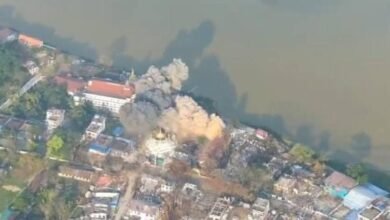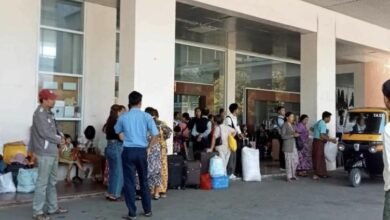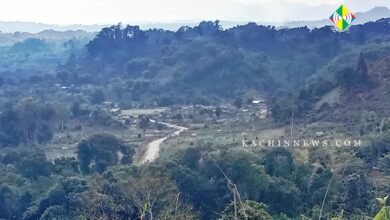KSPP political party registration accepted by junta

The junta’s Union Election Commission (UEC) approved the registration of the Kachin State People’s Party (KSPP) on 19 August 2024, meaning that the junta now officially recognises the party.
The KSPP, which received strong support from the Kachin community during the 2020 election, applied for registration as a political party in March 2023, under the new registration law enacted by the junta. It was approved under Section 9 of the Political Parties Registration Law.
The only legally allowed political parties are those who have successfully registered with the UEC. Also, only UEC registered political parties will be able to take part in the junta’s planned upcoming elections, that many people have said they will boycott for being a sham.
The KSPP said it had to become registered with the junta to ensure its survival.
KNG attempted to contact KSPP officials regarding the matter but it was unable to establish contact due to ongoing phone line and internet network outages.
Talking of the KSPP’s registration a veteran Kachin State politician said: “The junta may have approved the party’s registration simply because it anticipated that KSPP would be cooperative. From KSPP’s perspective, registration might have been a matter of survival. At this point, I believe the registration status of the party is not particularly important.”
KSPP was the third Kachin political party to successfully register with the junta. the Lisu National Development Party (LNDP) and the New Democracy Party – Kachin (NDP-K), also known as the Crossbow Party were also granted registration by the junta.
A fourth Kachin political party, the Kachin National Congress (KNC) had its application for registration rejected on 9 July 2024 because they allegedly did not meet some of the requirements of Section 6 of the Political Parties Registration Law.
Another Kachin political activist said that he thought the KSPP had decided to register with the junta so that it could continue as a political party.
He said to KNG: “Right now, it’s essential to take a clear and decisive stand. The path chosen by the KSPP, especially in a situation where the junta is not recognised by anyone, appears deeply undignified. It also reveals that the KSPP is no longer capable of making bold decisions.”
Another young Kachin democracy activist who disapproved of the KSPP’s registration with the junta said: “I believe this is not a favourable time for political parties. Therefore, KSPP’s compromise with the junta is not only unnecessary but also an insult to its public support. Currently, there are people-centered parties that continue to operate without registering with the junta. The junta has announced that the election will proceed and will take all measures to ensure its success. The success of the election will largely depend on public support. To achieve the federal democracy we aspire to, we must collaborate with all resistance forces and oppose this election.”
Another young Kachin political analyst commented that the decision by Kachin parties to cooperate with the junta could have implications for future unification efforts.
She said: “Different organisations within Kachin State hold different political views. Some choose armed resistance, while others might prefer participating in elections through party politics. However, opting to enter the election after submission to the junta is likely to create confusion in the future. When the entire population supports armed resistance, such actions by political parties are not smart at all. Even if they win the election, they will hold no real power, as all authority will remain with the junta. Therefore, their choice cannot be considered as the right solution.”
Following the 2015 elections when Kachin parties failed to win any seats, the Kachin Democratic Party (KDP) led by U Awng Kham, the Kachin State Democracy Party (KSDP) led by Dr. Manam Tu Ja, and the Unity and Democracy Party of Kachin State (UDPKS) led by U Khat Htein Nan and Daw Dwe Bu merged to form the KSPP.
In the 2020 elections, the KSPP contested a total of 67 seats in various legislatures. These included 18 Pyithu Hluttaw (Union Lower House) seats spread over 18 townships in Kachin State, 12 Amyotha Hluttaw (Union Upper House) seats, 35 seats in the Kachin State Hluttaw, and the Minister of Ethnic Affairs position. Ultimately, four representatives from the party won seats in three constituencies.
Dr. Manam Tu Ja, the current chairman of the KSPP, served as the vice chairman of the Kachin Independence Organization (KIO) for a decade until 2009. He is also a member of the Union Peace Dialogue Joint Committee (UPDJC), a negotiating committee for the Myanmar peace process that was formed in 2016 as part of the peace process outlined by the Nationwide Ceasefire Agreement (NCA) signed on 15 October 2015.
The KSPP Deputy Chair, Daw Dwe Bu, is currently a member of the junta’s State Administration Council (SAC).
The chairman of the UDPKS, U Khat Htein Nan, is currently the Kachin State Chief Minister, he was appointed to the position by the junta.
As a party that was once strongly supported by ethnic Kachin people, there has been significant public criticism KSPP’s decision to register the party with the junta’s UEC.




